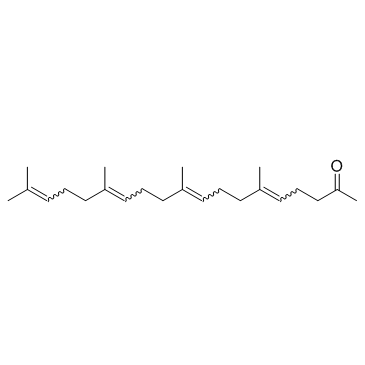
Teprenone
CAS No. 6809-52-5
Teprenone( Geranylgeranylacetone | Tetraprenylacetone )
Catalog No. M19823 CAS No. 6809-52-5
Teprenone is a anti-ulcer drug and works as an inducer of heat shock proteins (HSPs).
Purity : >98% (HPLC)
 COA
COA
 Datasheet
Datasheet
 HNMR
HNMR
 HPLC
HPLC
 MSDS
MSDS
 Handing Instructions
Handing Instructions
| Size | Price / USD | Stock | Quantity |
| 50MG | 41 | In Stock |


|
| 100MG | 56 | In Stock |


|
| 200MG | Get Quote | In Stock |


|
| 500MG | Get Quote | In Stock |


|
| 1G | Get Quote | In Stock |


|
Biological Information
-
Product NameTeprenone
-
NoteResearch use only, not for human use.
-
Brief DescriptionTeprenone is a anti-ulcer drug and works as an inducer of heat shock proteins (HSPs).
-
DescriptionTeprenone is a anti-ulcer drug and works as an inducer of heat shock proteins (HSPs).(In Vitro):Teprenone is an inducer of HSPs. Teprenone (Geranylgeranylacetone, 1 μM) significantly prevents ethanol-induced exfoliation, and reduces lactate dehydrogenase (LDH) release in gastric mucosal cells. Teprenone (1 μM) gradually increases HSC70 level, and rapidly accumulates the stress-inducible HSP90, HSP70, and HSP60 concentrations within 30-60 min. Teprenone also activates the heat shock factor 1.Teprenone (0-20 μM) slightly increases human umbilical vein endothelial cell (HUVEC) viability following irradiation (IR). Teprenone (10 μM) exhibits no effects on HUVEC migration and invasion, but enhances HUVEC tube formation and wound healing both with and without IR. Teprenone (10 μM) also promotes angiogenesis by inducing VEGF and eNOS expression in HUVECs.(In Vivo):Teprenone (200 mg/kg, p.o.) results in the accumulation of HSP70 mRNA in rats, and the accumulation is enhanced by stress addition in the mucosa of Teprenone-pretreated rats compared with that of vehicle-pretreated rats. Teprenone (200 mg/kg, p.o.) markedly suppresses the ulcer formation after 2- and 4-hour stress loading in rats.Teprenone (200 mg/kg daily) induces HSP72 in retinal ganglion cells (RGCs) from rat retinas. Teprenone significantly reduces the loss of RGCs (evaluated after intraocular pressure (IOP) elevation), lessens optic nerve damage, decreases the number of TUNEL-positive cells in the RGC layer, and increases HSP72 in a rat model of glaucoma.Teprenone (200 mg/kg, p.o.) shows protective effect on radiation-induced intestinal injury in mice.
-
In VitroTeprenone is an inducer of HSPs. Teprenone (Geranylgeranylacetone, 1 μM) significantly prevents ethanol-induced exfoliation, and reduces lactate dehydrogenase (LDH) release in gastric mucosal cells. Teprenone (1 μM) gradually increases HSC70 level, and rapidly accumulates the stress-inducible HSP90, HSP70, and HSP60 concentrations within 30-60 min. Teprenone also activates the heat shock factor 1. Teprenone (0-20 μM) slightly increases human umbilical vein endothelial cell (HUVEC) viability following irradiation (IR). Teprenone (10 μM) exhibits no effects on HUVEC migration and invasion, but enhances HUVEC tube formation and wound healing both with and without IR. Teprenone (10 μM) also promotes angiogenesis by inducing VEGF and eNOS expression in HUVECs.
-
In VivoTeprenone (200 mg/kg, p.o.) results in the accumulation of HSP70 mRNA in rats, and the accumulation is enhanced by stress addition in the mucosa of Teprenone-pretreated rats compared with that of vehicle-pretreated rats. Teprenone (200 mg/kg, p.o.) markedly suppresses the ulcer formation after 2- and 4-hour stress loading in rats.Teprenone (200 mg/kg daily) induces HSP72 in retinal ganglion cells (RGCs) from rat retinas. Teprenone significantly reduces the loss of RGCs (evaluated after intraocular pressure (IOP) elevation), lessens optic nerve damage, decreases the number of TUNEL-positive cells in the RGC layer, and increases HSP72 in a rat model of glaucoma.Teprenone (200 mg/kg, p.o.) shows protective effect on radiation-induced intestinal injury in mice.
-
SynonymsGeranylgeranylacetone | Tetraprenylacetone
-
PathwayCytoskeleton/Cell Adhesion Molecules
-
TargetHSP
-
RecptorHSP
-
Research AreaCancer
-
IndicationGastritis; Peptic ulcer
Chemical Information
-
CAS Number6809-52-5
-
Formula Weight661.09
-
Molecular FormulaC46H76O2
-
Purity>98% (HPLC)
-
SolubilityDMSO:≥ 32 mg/mL (96.81 mM)
-
SMILESCC(=O)CC\C=C(/C)CC\C=C(/C)CC\C=C(/C)CC\C=C(\C)C
-
Chemical Name——
Shipping & Storage Information
-
Storage(-20℃)
-
ShippingWith Ice Pack
-
Stability≥ 2 years
Reference
1.Caprioli J et al. Retinal ganglion cell protection with geranylgeranylacetone a heat shock protein inducer in a rat glaucoma model. Trans Am Ophthalmol Soc. 2003;101:39-50; discussion 50-1.
molnova catalog



related products
-
YM-1
YM-1 is a close derivative of MTK-077 that allosterically promotes Hsp70 binding to unfolded substrates, specificly binds to Hsp70 with Kd of 4.9 uM.
-
VER-155008
A potent Hsp70 family (Hsc70/Hsp7/Grp78) inhibitor with Kd of 80 nM for Grp78.
-
A-17
A potent Hsp90α/p23 interaction inhibitor with IC50 of 0.15 uM.



 Cart
Cart
 sales@molnova.com
sales@molnova.com


